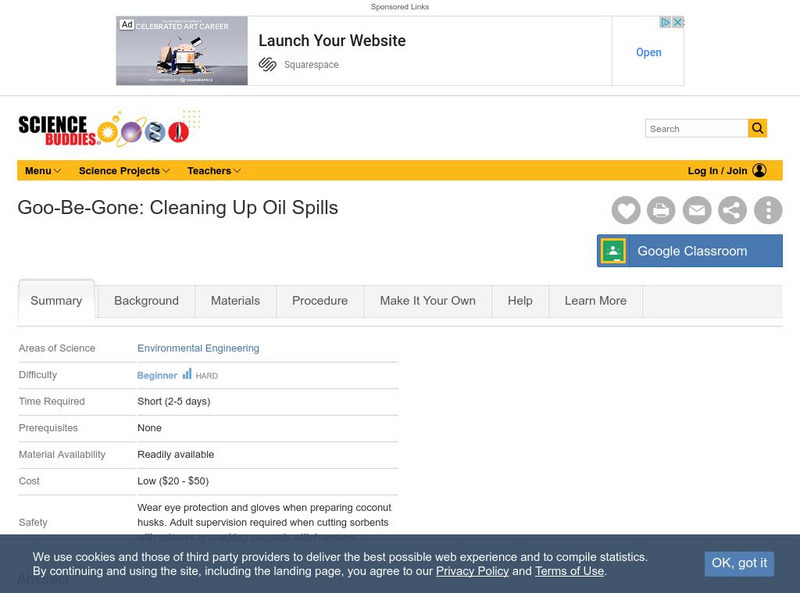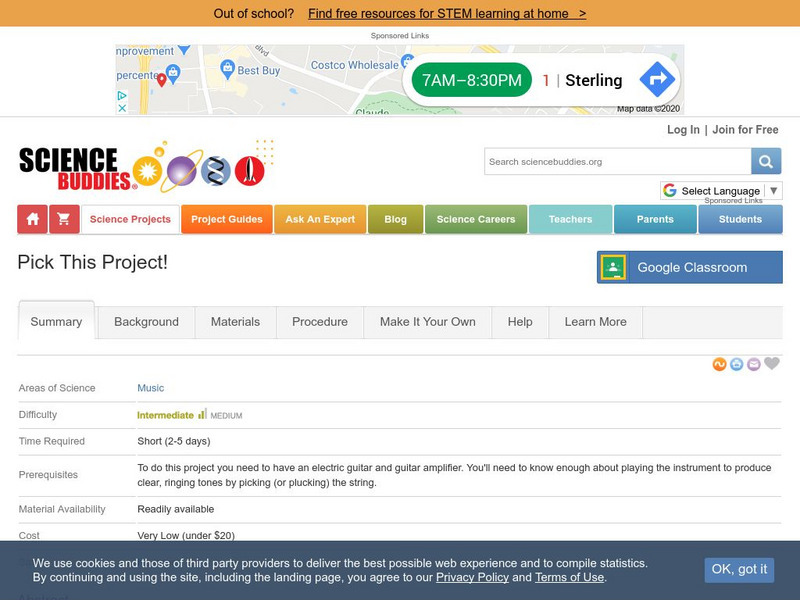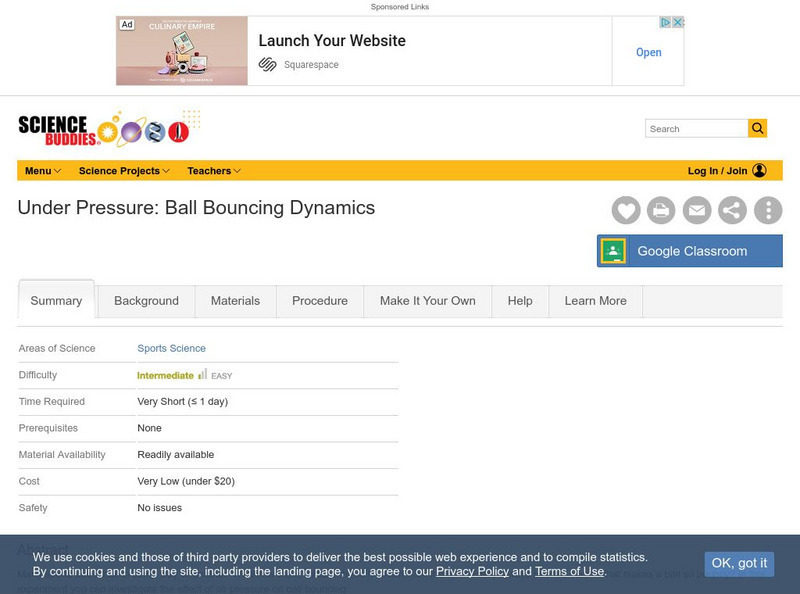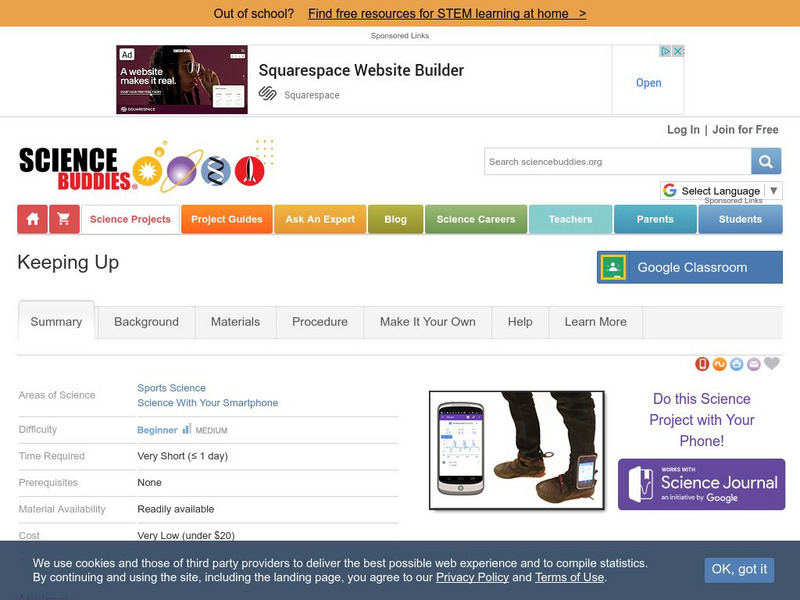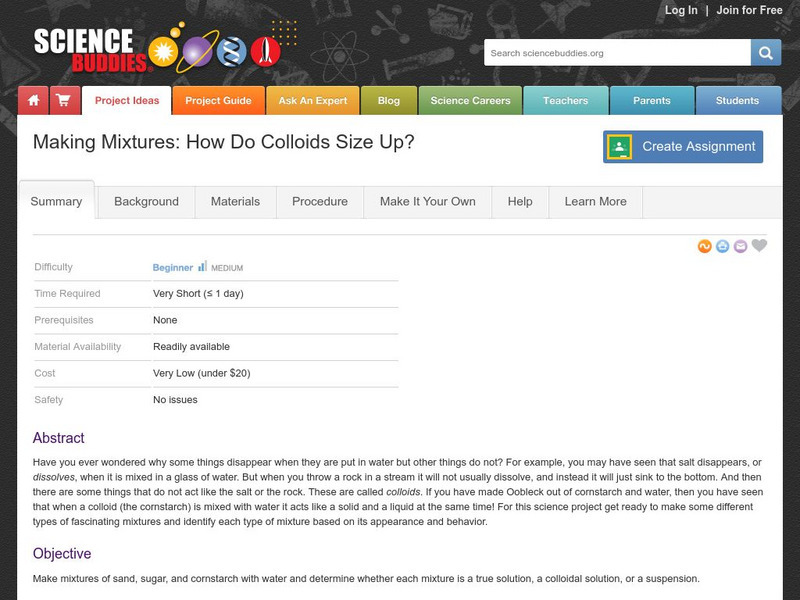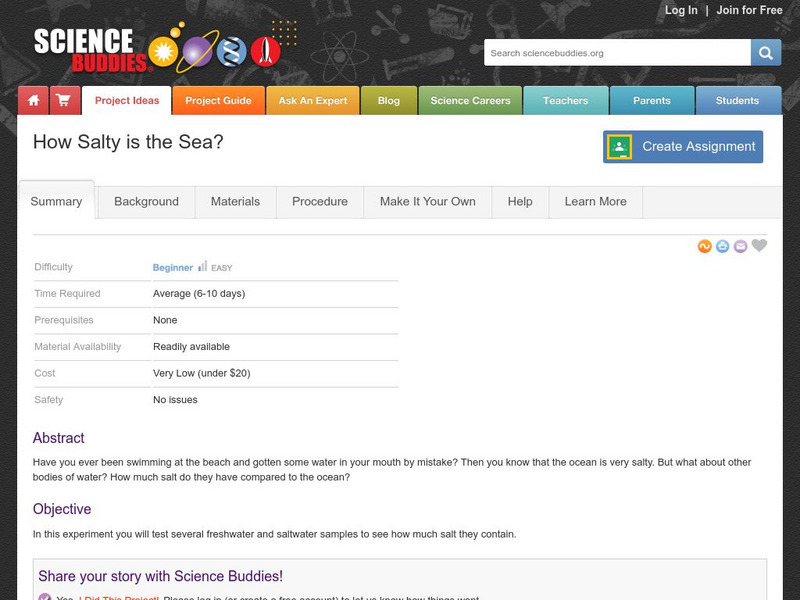Science Buddies
Science Buddies: A Battery That Makes Cents
Batteries are expensive to purchase in a store, but you can make one your self for exactly 24 cents. In this experiment, you will make your own voltaic pile using pennies and nickels and determine how many coins in a pile will make the...
Science Buddies
Science Buddies: Out of Control!
Some games have control schemes that are real-world based, such as the Nintendo Wii. Your job will be to discover if inexperienced players perform better when using real-world-based control schemes rather than abstract control schemes.
Science Buddies
Science Buddies: Riprap: It's Not Hip Hop but Erosion Stop
The Grand Canyon serves as an excellent example of just what water can do over a period of millions of years. This week long lab will help you understand how erosion works, how engineers work to help prevent erosion.
Science Buddies
Science Buddies: Goo Be Gone: Cleaning Up Oil Spills
Oil spills devastate wildlife and our precious water resources. Test the absorptivity of different materials (sorbents) to discover which ones are best at removing oil from water in this brief lab.
Science Buddies
Science Buddies: Set Your Table for a Sweet and Sticky Earthquake Shake
Earthquakes can have different affects depending on their location. This week long exercise asks you to build a model house and a special table to shake it on, and see how different soil types can amplify shaking.
Science Buddies
Science Buddies: Pick This Project!
This lab will help you understand the physics of vibrating strings, and find out why the tone of an electric guitar changes when you switch between the different pickups. If playing guitars is a hobby of yours, this experiment makes an...
Science Buddies
Science Buddies: Under Pressure: Ball Bouncing Dynamics
Many sports use a ball in some way or another. We throw them, dribble them, hit them, kick them, and they always bounce back. What makes a ball so bouncy? In this experiment you can investigate the effect of air pressure on ball bouncing.
Science Buddies
Science Buddies: Does a Cell Phone Conversation Affect Reaction Time?
Does talking on a cell phone make one a more dangerous driver? Here is an experiment you can do to investigate whether reaction time is adversely affected by a simultaneous phone conversation.
Science Buddies
Science Buddies: Think Fast!
Are you a piano player or a video gamer? Then you might have a quick reaction time that can come in handy while playing sports. Find out how to measure your reaction time and compare it to your friends and family with this fun experiment.
Science Buddies
Science Buddies: Are Laminates Stronger?
If you love to hit the half pipe with your snowboard or skateboard, then you have tested the strength and durability of laminates. Laminates are sandwiches of different materials that are glued together in layers to give strength and...
Science Buddies
Science Buddies: Keeping Up
Do you ever feel like you need to walk faster than your parents just to keep up with them? This is because of the difference in leg length between you and your parents. In this experiment you will test if the height of a person is...
Science Buddies
Science Buddies: Getting Critical Over Colloids
What is a colloid? If you have made Oobleck out of corn starch and water, then you know that a colloid is a mixture that acts like a solid and a liquid at the same time. This activity helps you determine the critical factors that...
Science Buddies
Science Buddies: Timing the Tides
Have you ever been to a tide pool during low tide? Some intertidal animals in the low tide zone are left in a tiny pool of water when the tides go out. Other intertidal animals that live in high tide zones may be left to dry out during...
Science Buddies
Science Buddies: How Salty Is the Sea?
Have you ever been swimming at the beach and gotten some water in your mouth by mistake? Then you know that the ocean is very salty. Bodies of freshwater also contain some salt, but much less compared to oceans. In this experiment you...
Science Buddies
Science Buddies: Which Is the Better Insulation Material?
You've probably noticed that the price of gasoline can fluctuate a great deal from one year to the next. Using good insulation material is one way to conserve energy and save money. Learn here which insulation materials work better than...
Science Buddies
Science Buddies: Primary Productivity and Plankton
The oceans contain both the earth's largest and smallest organisms. Interestingly they share a delicate relationship linked together by what they eat. The largest of the ocean's inhabitants, the Blue Whale, eats very small plankton,...
Science Buddies
Science Buddies: The Viscosity of Motor Oil
The insides of a car engine get very hot when the engine is running. Motor oil lubricates the moving parts, to keep the engine operating smoothly. Learn what happens to motor oil as the engine temperature goes up.
Science Buddies
Science Buddies: Fallen Arches: The Surprising Strength of Eggshells
Arches have been used for structural engineering since ancient times. This experiment tests the strength of a naturally occurring arch shape: the shell of an egg. How much weight do you think an eggshell can support?
Science Buddies
Science Buddies: Coke & Mentos Nucleation Goes Nuclear!
You may have seen it on You Tube and David Letterman - the exploding Coke and Mentos experiment? But what is it that makes the reaction happen? In this experiment you will see if tiny dimples called nucleation sites have anything to do...
Science Buddies
Science Buddies: Camera Lens Testing
This activity helps students learn more about cameras, and how to take better pictures.
Science Buddies
Science Buddies: Using a Laser to Measure the Speed of Light in Jello
Think it takes expensive, sophisticated equipment to measure the speed of light? Think again. Outfit yourself with a simple handheld laser pointer, a protractor, and Jell-O, and you're ready to get started.
Science Buddies
Science Buddies: Paper Chromatography: Advanced Version 2
Chromatography is a method used to separate mixtures of compounds and to identify each compound in the mixture. You may have separated the different inks in a black marker by using a strip of paper and water. There are many different...
Science Buddies
Science Buddies: Measuring the Surface Tension of Water
Did you know that when you dip your finger in water and pull it out, the water is actually pulling back on you? Here's a way you can measure how much.
Science Buddies
Science Buddies: Cabbage Chemistry
This experiment is for all the kids out there who love boiled cabbage. Even if you don't like cabbage, perhaps you will like this amazing color-changing liquid you can make with cabbage. You'll learn which solutions around your house can...





